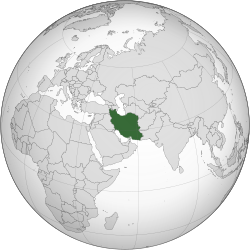The Interim Government of Iran
| Interim Government of Iran | ||||||||||
|
دولت موقت ايران Dowlat-e Movaghat-e Irân |
||||||||||
|
||||||||||
|
Motto Allaho Akbar الله اکبر "God is the Greatest" |
||||||||||
|
Anthem Ey Iran ای ایران "Oh Iran"
|
||||||||||
|
The Interim Government of Iran in 1979.
|
||||||||||
| Capital | Tehran | |||||||||
| Languages | Persian | |||||||||
| Religion | Shia Islam | |||||||||
| Government | Provisional Government (as a Transitional government) | |||||||||
| Prime Minister | ||||||||||
| • | 1979 | Mehdi Bazargan | ||||||||
| Legislature | Council | |||||||||
| Historical era | Cold War | |||||||||
| • | End of Iranian Revolution | 11 February 1979 | ||||||||
| • | Iranian hostage crisis | 4 November 1979 | ||||||||
| Currency | Iranian rial | |||||||||
|
||||||||||
The Interim Government of Iran (Persian: دولت موقت ايران, Dowlat-e Movaghat-e Irân), was the first government established in Iran after the Iranian Revolution. The government was headed by Mehdi Bazargan, one of the members of the Freedom Movement of Iran, and formed on the order of Ruhollah Khomeini (known as the Ayatollah Khomeini) on 4 February 1979. From 4 February to 11 February, Bazargan and Shapour Bakhtiar, the Shah's last Prime Minister, both claimed to be the legitimate prime minister; Bakhtiar fled on 11 February. Mehdi Bazargan was the prime minister of the interim government and introduced a seven-member cabinet on 14 February 1979. Ebrahim Yazdi was elected as the Foreign Minister.
The constitution of the Islamic Republic of Iran was adopted by referendum on 24 October 1979. Before it could come into force on 3 December 1979, however, the government resigned on 6 November soon after the taking over of the American embassy, an act the government opposed but revolutionary leader Khomeini supported. The Council of the Islamic Revolution then served as the country's government until the formation of the first Islamic Consultative Assembly on 12 August 1980. Bazargan was elected to the first Islamic Consultative Assembly representing Tehran.
...
Wikipedia


